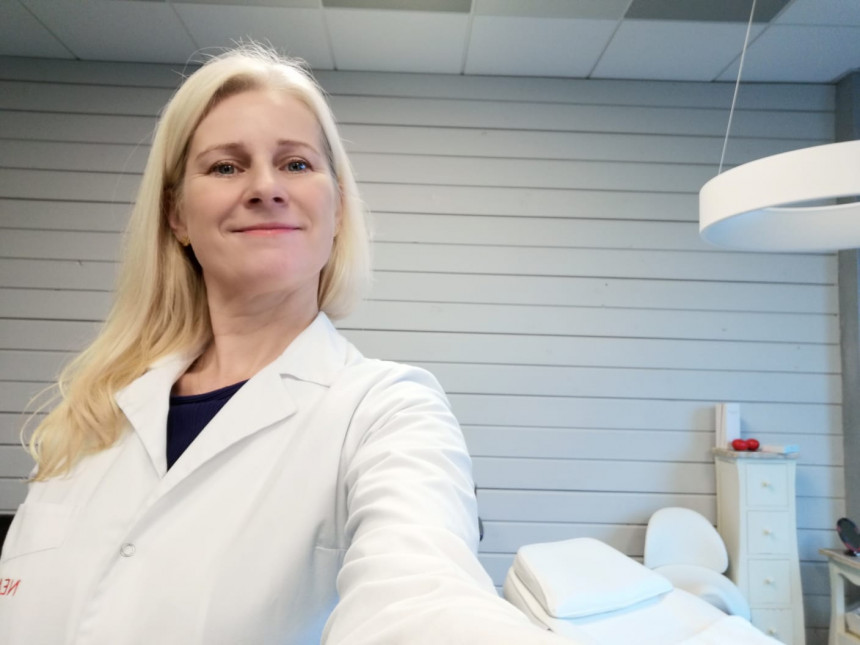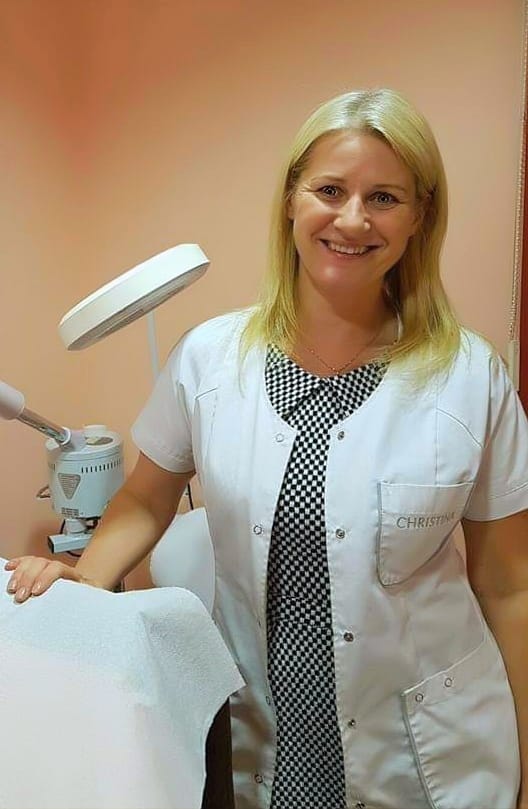Beauty industry representative Sabīne Ulberte: Talking with Viņķele is like talking to a brick wall

"At one moment, Minister Viņķele started shouting at us: why are you asking me how to make ends meet, why don't you ask the Minister of Finance Reirs or someone else?! But if Viņķele hadn't stopped people in the industry from working, we wouldn't be talking about support now! We have more or less managed since the spring. How can they insist on compliance with restrictions if we are barred from working? So what do we comply with?” - Sabīne Ulberte, cosmetology specialist, president of the Latvian Association of Beauty Specialists, asks rhetorically, talking about the remote meeting with the Minister of Health Ilze Viņķele (Development/For!, Attīstībai/Par!), which took place on Friday.
There were hopes that the minister would listen to the industry's arguments and allow beauty professionals to work, but the "listening apparatus" was apparently not turned on, and everyone parted as if they had not spoken or heard a thing. Among other things, the online petition website manabalss.lv collected almost 12,000 signatures in a very short time on the lifting of restrictions on sauna and other beauty services. The initiative has been submitted to the Saeima, the Speaker of the Saeima and the Prime Minister. "No reaction," says Sabīne Ulberte.
"Just like a beautiful hairstyle or a well-groomed manicure are important to make a person feel better, no less important is the cleanliness of the body, a positive mood and good sleep, maintaining the usual sauna and daily body care rituals that have a positive effect not only physically but also on a psycho-emotional level. Depriving people who regularly attend individual sauna, body care and beauty services for health care and disease prevention will worsen their immunity and overall physical and psycho-emotional health, thus creating an additional threat to the spread of the virus,” said the initiative of beauty specialists.
The decision of November 6 is unfair and unequal in relation to individual beauty industries that directly care for the maintenance of well-being in a healthy way - individually practitioning sauna masters, masseurs, beauticians and other beauty professionals, for whom it is the only source of income.
While the high-up gentlemen and ladies are thinking, in many places, beauty professionals are already being evicted because they have no money to pay for rent. "Soon we will start moving out of rented apartments. The government says - stay at home! But how to stay there, if there will no longer be a place to stay in? Does the government really want someone to jump off the bridge?!” - Sabīne is close to despair, and her story about meeting Minister Viņķele is as hopeless as the prospects for survival in the near future.
Was the meeting with the Minister of Health Ilze Viņķele unsuccessful?
The feeling was that Minister Viņķele had no desire to listen to us, delve into our problems and find a solution. I understand that not everyone is able to admit their mistakes, and the Minister was not ready to admit that a wrong decision has been made... All our offers were like talking to a brick wall.
You probably also said that the people who work in your industry have been left without a means of subsistence.
At one moment, Minister Viņķele started shouting at us: why are you asking me how to make ends meet, why don't you ask the Minister of Finance Reirs or someone else?! But if Viņķele hadn't stopped people in the industry from working, we wouldn't be talking about support now! We have more or less managed since the spring. How can they insist on compliance with restrictions if we are barred from working? So what do we comply with? But Viņķele just keeps talking and talking about restrictions that will become even stricter... Yes, there must be restrictions, but now we are talking about a ban on working! That is a completely different thing. And then she adds: such high infection rates are because society is reluctant to cooperate.
Of course, society is to blame again.

In the spring, Latvia was a model country with low morbidity rates. The restrictions were understandable, logical, enforceable, and controllable. Our industry, together with the Ministry of Health, developed regulations that we worked under and did not close our industry in the spring. How is it really? I see everyone who enters my office as a potential source of infection, and so it was even before Covid-19. I, like any human being, have an instinct for self-preservation, I have a family, I must not infect it, and I have clients who I must not infect as well. That is why I follow absolutely all the rules on disinfection and epidemiology to make it a safe service. In the spring, Viņķele also encouraged the use of safe services by visiting certified professionals and legal salons. Now I don't understand: at what point did this safe service become unsafe? What is the reason for closing the industry if there is no known case of a person being infected with Covid-19 in a legal beauty salon? The most epidemiologically safe industry, which is at a higher level of safety than any medical institution, is being closed down, because my job depends most directly on my clients: if something happens to someone, I will no longer have any clients.
You work legally, you are a certified professional, and the vast majority of them are. But there are also the "invisible" ones...
Minister Viņķele draws a line directly on the visible, legal part. Those who were invisible slip into an even deeper shadow. And even a toddler would understand this, but not the Minister... I am inexpressibly disappointed. I thought: it's so simple, let me just explain, the Minister will understand everything. After that, my children said that I am too naive... But, logically, only those who have legally opened their salons can be monitored, and the inspection can reveal at any time whether we are complying with all the sanitary and epidemiological conditions. But what to do with those in the shadows? Nothing! They will be there, and no one will know if they are following any norms.
But hairdressers are allowed to work. Where is the logic? Will the hairdresser place a plastic partition between himself and his client's head?
Viņķele said that now, when stricter restrictions have been set in some municipalities, she though about closing the hairdressing services. But she thought that in that case people would look for hairdressing services in other municipalities! Seriously?! She has also assumed that hairdressing services are basic necessities. Is this also serious?! I heard that a lady with a disability called, she said that she was physically unable to take care of her fingernails and toenails. There are many such people, and that is a matter of health. Hair care, however, is easier - there are shampoos in stores, hair colors too. I do not understand why the absurdity proposed by the Minister should be accepted?!
Nobody understands that. But the minister does not understand that beauty care is not about beauty, it is actually about health care. But tell me, approximately how many people in Latvia work in the field of beauty care?
Together with hairdressers about four thousand. I think there are more, but these four thousand are registered in the database of the Health Inspectorate. 99% of these professionals are women. We keep hearing those insightful instructions - just retrain! Sorry, everyone who could do that has already retrained. And more. There are things that no one talks about. For example, I have a higher education, I am a certified medical practitioner, I obey the Medical Treatment Law, I have to renew my certificate every five years, I have to attend courses, I have compulsory further education. That also costs money, it's an investment in my education. However, there will not be many people with higher education among hairdressers, hairdressers are not related to the Medical Treatment Law, they are not certified medical personnel. Therein lies this absurdity: the work of the beauty industry, that is subject to the Medical Treatment Law and is under the control of the Health Inspectorate, is prohibited! In the spring, following the instructions of the ministry, plastic partitions were placed in the beauty salons, everyone worked in face masks, and all instruments were either disposable or can be properly sterilized. In part, we had already implemented it before Covid-19. It all cost money.
It is especially difficult, in my opinion, at the moment for those unemployed and therefore no-income beauty specialists who are single mothers.
You are talking to one now. I am divorced and have three children. I was actually the only earner in this family, and now I can't work anymore. And support from the state for us is zero. I no longer know what I... what we can do. We are thinking of turning to the ombudsman.
You definitely have to do that.
It's not just about me. The Constitution states that everyone has the right to work. But we no longer have the right to work, we have been deprived of that right! Should I secretly do a job that I do really well? These bans on beauty industry are disproportionate and absurd. We in this field are ready to cooperate and comply with security rules in the most direct way.